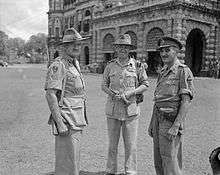Henry Chambers (Indian Army officer)
Major-General Henry Maurice Chambers CBE (15 July 1897 – 1967) was a British Indian Army officer of the Second World War.
Henry Maurice Chambers | |
|---|---|
 | |
| Born | 15 July 1897 Belfast, Ireland |
| Died | 1967 |
| Allegiance | |
| Service/ | |
| Years of service | 1914-1948 |
| Rank | Major-General |
| Commands held | 64th Indian Infantry Brigade 71st Indian Infantry Brigade 26th Indian Infantry Division |
| Battles/wars | First World War Second World War |
| Awards | Commander of the Order of the British Empire, Mentioned in Dispatches |
Army career
Chambers received a temporary commission in the British Army as a second lieutenant on 26 September 1914 to the Royal Munster Fusiliers.[1] He served at Gallipoli and on the Western Front in the First World War, and on 3 December 1917 he was commissioned a Lieutenant into the 117th Mahrattas of the Indian Army.[2][3] Chambers was promoted to the rank of captain in June 1919. From 1924 to 1925 he attended the Staff College, Camberley, and between the wars he served in India as a staff officer and he became a lieutenant-colonel in September 1939.[4]
In 1942 Chambers became acting Commander of the 64th Indian Infantry Brigade, before serving as a brigadier on the General Staff until 1944. He then became commander of the 71st Indian Infantry Brigade, serving with the brigade during the Burma Campaign.[5] In early 1945 he was made Acting General Officer Commanding of the 26th Indian Infantry Division, before taking permanent command of the division later in the year, serving in Burma and Sumatra. Chambers was twice mentioned in dispatches for his actions during the war in the Far East, and in January 1946 he was invested as a Commander of the Order of the British Empire.[6] He retired from the army as a major-general in 1948.
Family
In 1920 he married Aileen Geraldine Olga Allison, with whom he had two sons. They divorced in 1947.[7] He married again in 1954 to Sybil Ismay Siddons. He retired to South Africa.[8]
References
- "No. 28918". The London Gazette. 29 September 1914. p. 7690.
- "No. 30759". The London Gazette. 21 June 1918. p. 7333.
- Jan 1941 Indian Army List war services supplement
- 'Chambers, Henry Maurice' in Indian Army Officers 1939-1945 at unithistories.com, accessed 18 August 2015
- 'Chambers, Henry Maurice' in Indian Army Officers 1939-1945 at unithistories.com, accessed 18 August 2015
- "No. 37433". The London Gazette (Supplement). 15 January 1946. p. 493.
- 'Chambers, Henry Maurice' in Indian Army Officers 1939-1945 at unithistories.com, accessed 18 August 2015
- Kelly's Handbook 1967